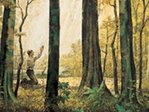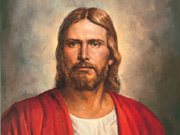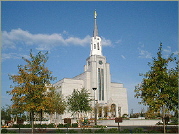I was just watching TV and they had children singing a hymn. When they came to the line "God and sinners reconciled", it became indistinguishable and trailed off. How crazy is the modern liberal view of separation of church and state? The modern idea of separation of church and state is in direct contrast to Roger Williams' notion. Roger Williams believed the more the merrier. As many differing opinions as possible on the matter of religion should be heard and considered, because truth wins out in honest minds. Modern liberalism's idea is that only some religious ideas should be tolerated at the exclusion of others, that some ideas are too dangerous to allow in the public discussion at all (and their 'dangerous' is usually the noblest).
As you know, Roger Williams founded Rhode Island. This was the first modern state to institute separation of church and state. Roger Williams never missed an opportunity to speak about spiritual things and God, thus demonstrating how far modern liberals have strayed from original intent. There was no state sponsored religion, no taxes to support a state run religion, but that never meant a public figure couldn't speak about God, that certainly never meant that they shouldn't pray frequently. If he was alive today, the modern liberal would tempt him to take a musket ball in the head.
There was a question in the youtube Republican debate about the Bible as the word of God. I got thinking about how everyone on that stage and indeed in the venue probably had a differing opinion on at least parts of the Bible, but can still believe it is the Word of God.
Roger Williams was perhaps the brightest, most liberal (when liberalism was a good thing) and pious of his generation. A man that most Christians as well Jews would hold in the highest esteem. It was because of His leadership, that the first Jewish community was founded in North America and he was co-founder of the first Baptist church in North America. How did he come to conclusions about true religion and priesthood authority, which are totally consistent with 'Mormonism'? I would submit that it was from a lifetime of Bible study and understanding its precepts. If you study Williams life, you will appreciate how much he loved the Bible and tried to live it, how much he desired to interpret it and live it correctly. He is a man who loved native Americans, who gave them free goods, who unlike the puritans, obtained their land legally, who did work for widows in his downtime and is universally loved by historians. He was a man so loved by the Narragansett Indians that their sachem asked to be buried in Williams clothing.
Here are some excerpts from Timothy L. Halls, "Separation of Church and State", University of Illinois Press, 1998. These are from pages 25-27. These quotes clearly show that the LDS idea of a need for apostolic succession and a line of authority aren't 19th century invention, but through careful study of the Bible, one can and should draw the conclusion that there was an apostasy in Christ's Church and that authority was lost and there was a need for a restitution.
"when [Roger Williams] arrived in Massachusetts he still believed that a pure church might be found if only he were to search for it diligently enough. In later years, though, Williams abandoned the search altogether. He became convinced that churches could not be established willy-nilly just because a band of individuals decided to form one. To found a church one needed a properly ordained minister, and - here was the rub - so far as Williams could tell, no such ministers existed any longer. To be ordained, one had to receive ordination from someone properly ordained by a minister of a true church. Now this chain of ordination had proceeded in an orderly fashion during the early years of the church. Christ had ordained apostles; they, in turn, had ordained church ministers; the ministers had ordained their successors; and so on. But, eventually, Williams thought, the chain had been disrupted. The line of apostolic succession had been severed by Constantine's nationalization of Christianity in the fourth century. At that point, Williams believed, the true church had died, and with it the chain of ordinations that kept the ministry alive." Roger Williams liked to speak of a hedge separating church and state and how when you removed the hedge, state corrupted religion. He was more concerned about the state's ill effect on religion than true religions ill effects on state when there existed no hedge or wall separating the two. Isiah 5:4 'What could have been done more to my vineyard, that I have not done in it? wherefore, when I looked that it should bring forth grapes, brought it forth wild grapes?
5:5 And now go to; I will tell you what I will do to my vineyard: I will take away the hedge thereof, and it shall be eaten up; and break down the wall thereof, and it shall be trodden down' (my interjection not Hall)
"Thereafter, the world was ruled by the anti-Christian Roman Catholic Church and had become a wilderness in which true believers roamed as pilgrims, without benefit of ministry or sacrament." (Hall)
Amos 8:12 "And they shall wander from sea to sea, and from the north even to the east, they shall run to and fro to seek the word of the LORD, and shall not find it."
If anyone is fulfillment of this prophecy, it is Roger Williams. He searched all over England and then to New England. He founded a group called the seekers and encouraged all religions to come to Rhode Island, because he wanted to find the truth if it existed in its fullness. (my interjection not Hall)
John Cotton wrote this about how Williams began to cut himself off from the New England churches because he didn't believe they possessed the authority to perform ordinances.
"And then [he] fell off from his ministry, and then from all church-fellowship, and then from his baptism and then from the Lord's Supper, and from all ordinances of Christ dispensed in any church-way, till God shall stir up himself, or some other new apostles to recover, and restore all the ordinances, and churches of Christ out of the ruins of Anti christian apostasy."
". . . . Williams eventually abandoned any hope of finding a pure church. He associated for a few months with an infant congregation of Baptists but ultimately separated from them because even they could not claim to have preserved the legacy of the apostolic church. How could they baptize anyone without a properly ordained minister to perform the baptism, and where could they find such a minister? In forming the Baptist church, one of the founding members had baptized Williams, who had baptized the remaining members. But now, Williams saw, he was not a true minister and could not conduct the ordinance of baptism. He saw no alternative but to withdraw from his so recently acquired Baptist brethren. They were trying to create a garden out of a barren wilderness of the world and had set upon an illusive quest for a church that had died and would remain dead until God resurrected it in the last days."
Jesus said this: Acts 20:29 "For I know this, that after my departing shall grievous wolves enter in among you, not sparing the flock"
Roger Williams talks about barren wilderness and lack of the beautiful garden, which is the church. It is described in like terms by Amos, 8:11 "Behold, the days come, saith the Lord GOD, that I will send a famine in the land, not a famine of bread, nor a thirst for water, but of hearing the words of the LORD"
But Roger Williams also foresaw a day when God would resurrect the church in the last days which is also consistent with the Bible Isiah 2:2,3 "And it shall come to pass in the last days, that the mountain of the LORD’s house shall be established in the top of the mountains, and shall be exalted above the hills; and all nations shall flow unto it. And many people shall go and say, Come ye, and let us ago up to the mountain of the LORD, to the house of the God of Jacob; and he will teach us of his ways, and we will walk in his paths: for out of Zion shall go forth the law, and the word of the LORD from Jerusalem."
This next passage is one of my favorite Roger Williams quotes, because it shows how diligently he searched for Christ's Church, but was unable to be satisfied that it was on the earth in the 1600s and how he knew as a biblical scholar, that there was a need for a restoration of authority to perform ordinances like baptism and there were no missionaries or "messengers to the nations" possessing an authentic message (mine not Hall):
"In the poor small span of my life, I desired to have been a diligent and constant observer, and have been my self many ways engaged in city, in country, in court, in schools, in universities, in churches, in old and New England, and yet cannot in the holy presence of God bring in the result of a satisfying discovery, that either the begetting ministry of the apostles or messengers to the nations, or the feeding and nourishing ministry of pastors and teachers, according to the first institution of the Lord Jesus, are yet restored and extant."
"Williams saw no alternative but to wait patiently until God at length sent apostles who had the power to start new churches. Until that time, there was no one available either to start a church or to sustain it."
Subscribe to:
Post Comments (Atom)








No comments:
Post a Comment